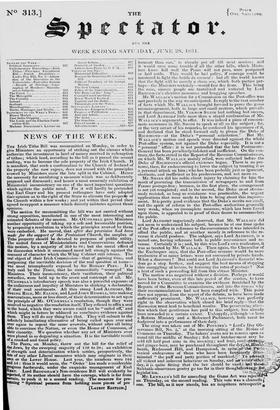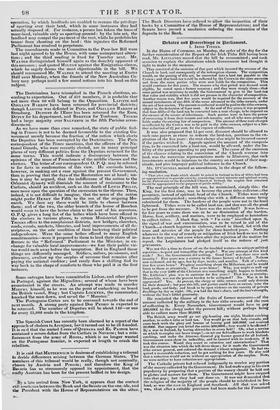NEWS OF THE WEEK.
The motion for recommitting the bill was not carried without strong opposition, manifested in one of the most interesting and animated debates of the session. Mr. O'CONNELL gave Ministers another opportunity of taking up a safe and honourable position, by proposing a resolution in which the principles avowed by them were embodied. He moved, that after due provision had been made for the support of the Protestant Church, the surplus of Tithe property should be devoted to purposes of public utility. The united forces of Ministerialists and Conservatives defeated this motion, by a majority of 360 to 99; but the moral effect of the discussion which it occasioned must tell strongly against the remnant of character which the Whig Cabinet still retains. The real object of their Irish Commission—that of gaining time, and postponing the inevitable decision of the real question at issue— was most triumphantly exposed by Sir ROBERT PEEL. It is truly said by the Times, that he unmercifully "scourged' the Ministers. Their inconsistency, their vacillation, their political cowardice, were held up to the scorn and contempt of all. Mr. GCoNNELL's introductory speech was also a powerful exposure of the unfairness and irnpolicy of Ministers in shirking a declaration of their real sentiments. All this stung Lord ALTHORP, Mr. SPRING RICE, Mr. ELLICE, and Lord JOH N RUSSELL, into making asseverations, more or less direct, of their determination to act upon the principle of Mr. O'CoNNELL's resolution, though they were resolved to negative the resolution itself. They refused to affix a seal to the bond, which they were aware could not be "railed off," and Which might in future be adduced as conclusive evidence against them. They will do any thing but that. They will submit to the infinitely humiliating alternative of being called upon over and over again to repeat the same avowals, without after all being able to convince the Nation, or even the House of Commons, of their Eincerity. We question whether any set of Ministers ever were placed in so degrading a situation. It is the inevitable result of crooked and timid policy.
The Peers, on Monday, threw out the bill for the relief of
the Jews, by the sweeping majority of 130 to 38; an exhibition of strength and determination which settles, prospectively, the fate of any other Liberal measures which may originate in their
own or the Lower House. Last year, the numbers were 104 and 54 : thus it would seem, the "Order" has made considerable
Progress backwards, under the exquisite management of Earl GREY. Lord BROUGHAM'S Non-residence Bill will evidently be rejected, if its author should have the courage, which is far from stain, to push it to a second reading. The measure for pre- ming " Spiritual persons from holding more pieces of pre
ferment than one," is already put off till next session; and it would save some trouble if all the other bills, which Minis- ters know full well the Peers will not pass, were postponed
or laid aside. This would be bad policy, if courage could be mustered to fight the battle in earnest ; but all the world knows that the fight will be merely a sham one, which both parties per- haps—the Ministers certainly—would fain flee from. This being the case, sincere people are tantalized and irritated by Lord BROUGHAM'S abortive measures and bragging speeches. Mr. WALLACE'S motion for a Commission on the Post-office was met precisely in the way we anticipated. In reply to the vast number of facts which Mr. WALLACE brought forward to prove the gross mismanagement, both in large and small matters, which prevails in that department, Mr. VERNON SMITH had nothing but sneers, and Lord ALTHORP little more than a stupid confirmation of Mr.
WALLACE'S argument, to offer. It was indeed a piece of consum- mate assurance in Mr. SMITH to speak at all on the subject ; for,
at the very outset of his remarks, he confessed his ignorance of it, and declared that he stood forward only to please the Duke of Ricrirdosno—at the Duke's " personal solicitation." But Mr.
WALLACE'S motion and speech were directed against the whole Post-office system, not against the Duke especially. It is not a " personal" affair: it is not pretended that the late Postmaster- General has been peculiarly indolent and inefficient. On the con- trary, the facts stated in the Report of the Revenue Commissioners, on which Mr. WALLACE mainly relied, were collected before the Duke of RICHMOND'S official existence began. There is no pre- tence, then, for endeavouring to lower the subject by treating it as a personal attack on him; who has been probably just as ignorant, obstinate, and inefficient as his predecessors, and not more so. Mr. SMITH did his noble client injury by claiming for him the merit of procuring the transmission of newspapers to and from
France postage-free; because, in the first place, the arrangement is not yet completed; and in the second, the Duke most strenu- ously resisted, as long as resistance was praoticable, the urgent applications that were made to him to bring about this improve- ment. his pretty good evidence that the Duke's merits are small, and the spirit of reform in the Post-office authorities generally very weak, when an incomplete measure, which has been forced upon them, is appealed to in proof of their desire to accommodate the public.
Lord ALTIIORP sagaciously observed, that Mr. WALLACE did not seem to understand his subject, becatve he at one time spoke
of the Post-office in reference to the convenience it was intended to afford the public, and at another merely in reference to the re- venue it should produce. The subject, says Lord Amaroar, is a mixed one, having reference both to public convenience and re- venue. Certainly it is; and, by this wise Lord's own confession, it was so treated by Mr. WALLACE. Then again, the Chancellor of the Exchequer says, that the Post-office revenue would be more
productive if so many letters were not conveyed by private hands. What a discovery ! But could not Lord ALTHORP'S financial wis-
dom go a step further, and suggest the best means of stopping this smuggling of letters, by lowering the rates of postage ? Not a hint of such a proceeding fell from this obtuse Minister. The motion was negatived without a division. Perhaps it would have been better, even at this late period of the session, to have moved for a Committee to examine the evidence furnished by the Reports of the Revenue Commissioners, and into the causes why their recommendations had not been complied with. This point does not appear, from the report of the debate, to have been made
sufficiently prominent. Mr. WALLACE, however, was perfectly right in the observation which closed his brief reply--that the discussion must lead to beneficial results. The persevering atter.- tion which that gentleman has paid to this subject, has already been rewarded to a certain extent. Unhappily, although e have a Reform Ministry and a Reformed Parliament, both must be badgered into a performance of their duty. The sting was taken out of Mr. POULTER'S "Lord's Day Ob- servance Bill, No. 2," at the morning sitting of the House of Commons on Thursday. The bakers' ovens are to remain open as usual till the middle of Sunday; fish and butcher-meat may be sold till half-past nine in the morning; and fruit, confc and ginger-beer, may be purchased throughout the day— heath, Richmond Hill, and Hampstead, in spit' 1etPtit:fss,,;.:7\ tanical endeavours of those who have been faedlosuffy . minuted "the puff and patty portion of mankind. :IQ pkyett".. all violent and indecent behaviour on Sunday, and set veryrothetsjt• ' day, it is quite fitting that the law should be usedii lattrahei*:.! 47/- Sabbath-observance gentry go too far in their thougltle's legislation. U Mr. LENNARD'S bill for amending the Game Act was rejectfdli on Thursday, on the second reading. This vote was a shameful . one. Tile bill, as it now stands; has an iniquitous retrospective operation, by which landlords are enabled to resume the privilege of sporting over their land, which in some instances they had actually disposed of. For instance, a person has taken the lease of moor-land, valuable only as sporting-ground : by the late act, the landlord may compel the payment of the rent, while he prohibits his tenant from shooting on the land : this injustice the Reformed Parliament has resolved to perpetuate.
The amendments made in Committee to the Poor-law Bill were last night agreed to by the House, with some unimportant altera- tions; and the third reading is fixed for Tuesday next. Mr. WALTER distinguished himself again as the doughty opponent of this measure ; and quoted MILTON against the Emigration-clause, which he sagely deems the most objectionable in the bill. We should recommend Mr. WALTER to attend the meeting at Exeter Hifil next Monday, when the friends of the New Australian Co- lony may perhaps instil a few sound notions into his head on this subject.























 Previous page
Previous page